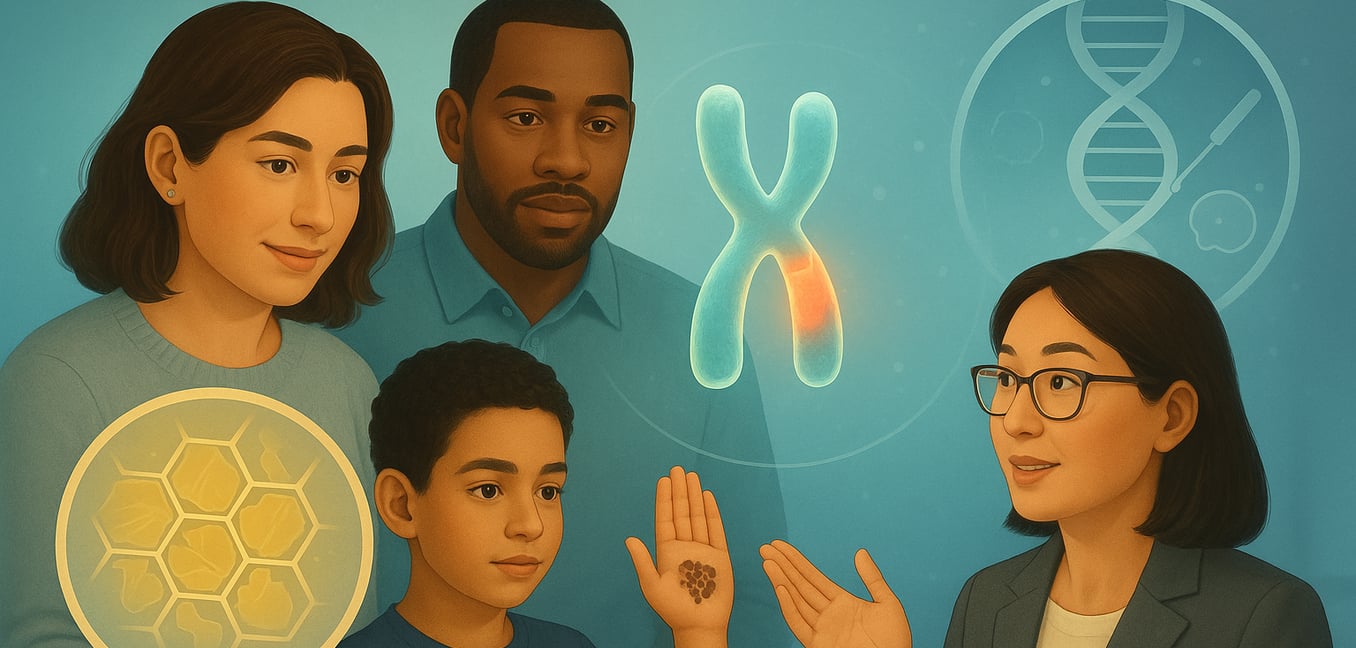How Genetic Counseling Guides Families Through X-Linked Ichthyosis
Recessive X-linked ichthyosis (XRI) is a genetic skin condition caused by a missing enzyme, steroid sulfatase (STS). While the body produces new skin cells normally, the old cells cannot shed properly. This happens because a substance called cholesterol sulfate builds up, acting like glue and holding dead cells to the skin’s surface, resulting in dark, polygonal scales. The impact of the missing STS enzyme goes beyond the skin, significantly increasing the likelihood of conditions like undescended testicles (cryptorchidism), attention-deficit hyperactivity disorder (ADHD), and autism spectrum disorder. Because the responsible gene is on the X chromosome, XRI almost exclusively affects males. In some cases, the genetic deletion is larger and includes neighboring genes, resulting in a "contiguous gene syndrome" with additional health challenges. For families facing this complex diagnosis, a genetic counselor is an essential guide, translating medical information into a clear plan of action.
The Genetic Counselor's Role: A Comprehensive Guide
A genetic counselor provides expert guidance at every stage, from the initial diagnosis to long-term planning. They help families understand the condition's full scope, navigate difficult decisions, and find the support they need.
Confirming the Diagnosis and Understanding Its Scope
While a dermatologist may suspect XRI, a genetic counselor helps secure a definitive answer and clarifies what it means for an individual's overall health.
- Arranges definitive testing. A counselor coordinates genetic tests, such as a detailed analysis that checks for the missing STS gene, to confirm the diagnosis with certainty.
- Interprets complex results. They explain the test results in plain language, clarifying whether the diagnosis is XRI or a more complex contiguous gene syndrome that may involve other health issues.
- Anticipates future health needs. This understanding allows the counselor to help the family create an initial roadmap for proactive care, ensuring all potential aspects of the condition are addressed from the start.
Clarifying Family Risk and Carrier Status
Understanding how XRI is passed through a family is crucial for relatives. A genetic counselor specializes in making these inheritance patterns clear.
- Identifies female carriers. They explain testing options for mothers, sisters, and aunts, helping them understand their carrier status and any associated health considerations.
- Explains the inheritance pattern. Using tools like a family tree, a counselor illustrates that a carrier mother has a 50% chance of having an affected son and a 50% chance of having a carrier daughter with each pregnancy.
- Assesses risk for future generations. This knowledge empowers family members to make informed decisions about their own health and future family planning.
Guiding Family Planning and Prenatal Decisions
For families aware of XRI, a genetic counselor provides a supportive space to explore reproductive options that align with their personal values.
- Explains prenatal screening results. If a routine pregnancy screening shows low estriol levels, a counselor can explain its link to XRI in a male fetus and discuss the next steps without causing undue alarm.
- Details prenatal diagnostic options. They discuss procedures like CVS and amniocentesis, which can determine if a fetus has XRI, allowing parents and their medical team to prepare for specific needs.
- Discusses advanced reproductive technologies. Counselors provide comprehensive information on options like in vitro fertilization (IVF) with preimplantation genetic testing (PGT), which allows parents to select an embryo that has not inherited the condition.
Providing Emotional Support and Connection
A diagnosis of XRI can be emotionally overwhelming. The genetic counselor's role extends beyond medical facts to include vital emotional and psychological support.
- Creates a safe space for communication. Counseling sessions offer a non-judgmental environment for families to voice fears, anxieties, and feelings of guilt, helping them process the news together.
- Connects families with support networks. Counselors provide links to patient advocacy groups like the Foundation for Ichthyosis & Related Skin Types (FIRST), reducing feelings of isolation by connecting families with a community that shares their experience.
- Empowers families with a proactive plan. They help shift the focus from challenges to actionable steps, such as early developmental support, which builds parental confidence and reinforces that a child is more than their diagnosis.
Initiating a Lifetime of Care: The Counselor's Roadmap
Living with XRI requires a multidisciplinary approach, and a genetic counselor is often the first to help assemble the necessary team. By creating a "roadmap" for care, they ensure that management is holistic from day one, setting the stage for a lifetime of proactive health monitoring. The counselor identifies which specialists are needed and facilitates the initial referrals, empowering the family to build a strong, coordinated care team.
The Dermatology Referral
The counselor will explain the central role of a dermatologist, who will manage the primary skin symptoms. This specialist establishes a daily care routine with moisturizers and other treatments to manage scaling and becomes the family's long-term partner for all skin-related concerns.
The Developmental Support Plan
Recognizing the high rates of ADHD and autism, the counselor will stress the importance of early intervention and refer the family to a developmental specialist. This expert can perform evaluations and coordinate therapies and educational support to help the child thrive.
The Urology and Endocrinology Connection
For boys with XRI, the counselor will facilitate a referral to a pediatric urologist to monitor for cryptorchidism, an issue that requires timely intervention to protect future health. They may also recommend a future consultation with an endocrinologist to monitor hormonal health.
The Proactive Cardiology Referral
Based on emerging research linking XRI to a higher likelihood of cardiac issues in adulthood, a counselor may recommend establishing long-term care with a cardiologist. This proactive referral ensures that heart health is monitored over the lifespan, preventing potential future complications.










